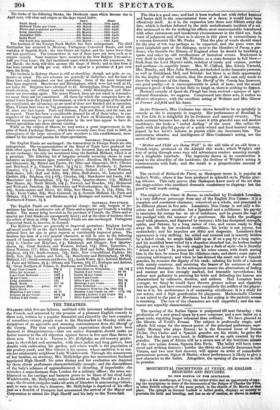THE THEATRES.
WEARIED with five-act failures, surfeited with incessant adaptations from the French, and attracted by the promise of a pleasant English comedy in three acts, written by a popular dramatist and played by the best company of comedians extant, people went to the Haymarket on Monday with an- ticipations of an agreeable and amusing entertainment from the Sheriff of the County. Pity that such pleasurable expectations should have been doomed to disappointment,—that our native dramatists should make no better answer to the old objection against farces in five acts than farces in three acts. Yet so it is. Farren is Mr. Hollylodge, an old country gentle- man in shovel-hat and spectacles with short jacket and long gaiters, bent double with cultivating his garden, and whose world is the population of his poultry-yard; and Mrs. Glover is his spouse, whose ambition is to out- vie her aristocratic neighbour Lady Winkleworth. Through the manceuvres a her brother, an attorney, Mrs. Hollylodge gets her unconscious husband appointed High Sheriff: his utter dismay and her exultation are depicted by these clever performers characteristically enough; and the discomfiture of the lady's schemes of aggrandizement is diverting, if improbable: she mistakes a state-footman from London for a military officer-' the arms em- blazoned on the carriage and banners prove to be those of her rival Lady Winkleworth; Mr. Hollylodge makes his debat as High Sheriff in a livery- coat; the liveried clodpoles make all sorts of blunders in announcing, visiters ; and, to sum up the day's disasters, Mr. Hollylodge is deprived of his office just as a flourish of trumpets had announced the arrival of the Mayor and Corporation to attend the High Sheriff and his lady to the Town-hall. The idea is a good one;. and had it been worked out with richer humour and better skill in the concentrated form of a farce, it would have been effectively drolL As it is, the expansion into three acts fritters away the fun; which is further defeated by the stale melodramatic incident of a sol- dier sentenced to die for striking his officer, most unaccountably introduced with other extraneous and incoherent circumstances in the third act. Such want of judgment and of tact as is shown in this piece is extraordinary in a veteran dramatist like Mr. Peake. That the play of words should stand for the play of wit, was perhaps to be expected; and the puns were the most laughable part of the dialogue, next to the blunders of Pansy, a gar- dener, who thumbs the History of England when he should be handling a spade, and rakes up odd recollections of historical events. Buckstone is very droll in this part; and Mr. Webster, as a state-footman in full blow— fresh from the Lord Mayor's table, redolent of turtle and venison' powder and perfume--is superbly inane. Mrs. W. Clifford, Mrs. Edwin Yamold, Mrs. Humby, and Miss Julia Bennett, are included in the dramatis personie, as well as Strickland, Holl, and Brindal: but there is so little opportunity for the display of their talents, that the strength of the cast only tends to show the weakness of the drama. The Sherif of the County has, however, one good quality—it is unexceptionable in point of taste, and the moral purpose is good: if there be but little to laugh at, there is nothing to disgust.
Morton's comedy of Speed the Plough has been revived—apropos of agri- cultural discussions, we suppose. Compressed into three acts, it makes an effective afterpiece; with the excellent acting of Webster and Mrs. Glover as Farmer Ashfieki and his dame.


























 Previous page
Previous page